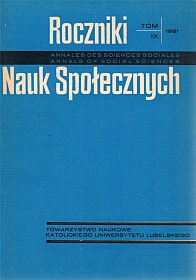Industrial Society in last Popes’ Opinion
Abstract
According to views of popes on industrial society that it has inter-disciplinary character, the author gives definitions of three thinkers; sociologist (T. Parsons), economist (J. K. Galbraith), and moralist (W. Weber). On this basis the author gives his own definition of industrial society. From the economic point of view such a society is characterized by: high income per capita, prevalence of industry in the State assets and the State revenue, mechanized and multiworks production, concentration of economic decisions in hands of huge factories, free-market economy, concentration of capital, prevalence of private production property and strong differentiation of life standards. Socially, this type of society is characterized by: separation of capital from work, powerful trade unions, social disintegration even of family life, class differentiation. In demographic sphere there are: concentration of people in cities and in industrial-centers, and great mobility of inhabitants. In moral view-point the following can be noticed: individualism, consumptionism, quest for profit and wealth, reduction of the morality level in economic sphere.
The author investigated views of John XXIII, Paul VI and John Paul II. On the basis of the documents of these popes, the author shows, that they appreciate the development of industrialization and urbanization but they show drawbacks of industrial civilization, moral warps and abuses in industrial society in our times. One should regard industrial form of society as a positive historical phenomenon only if such societies can manage to avoid moral drawbacks present in some elements of their contemporary definition.
Copyright (c) 1981 Roczniki Nauk Społecznych

This work is licensed under a Creative Commons Attribution-NonCommercial-NoDerivatives 4.0 International License.


